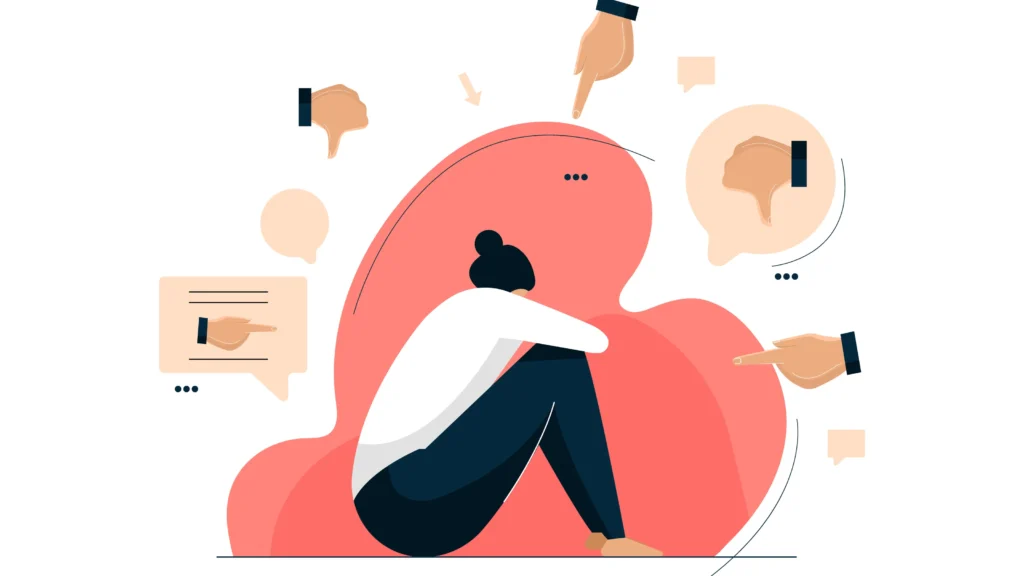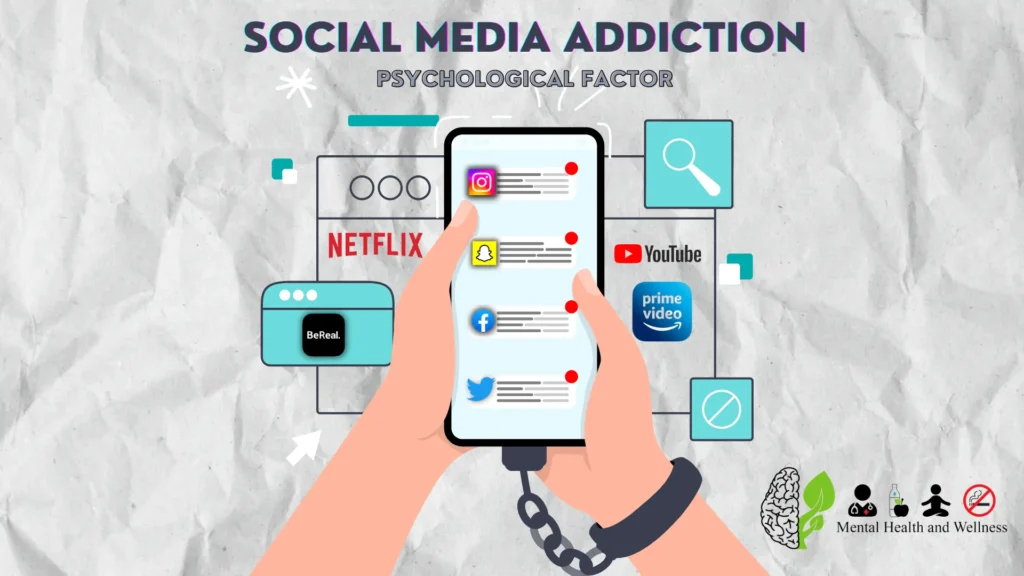
Social media has changed the way we connect with others. Here we can instantly share our thoughts, celebrate moments, or reach out to anyone across the world. But the influence of social media on mental health is also profound which affects us in unexpected ways.
Seeing only the “perfect” parts of others’ lives can make us feel insecure or anxious. Studies show that too much social media use can lead to feelings of loneliness, sadness, and low self-esteem. Instead of bringing us closer, it can sometimes make us feel more isolated.
But there is hope. By being aware of how social media affects us, we can make better choices. Finding a healthy balance between online and real-life connections can help us feel happier and more fulfilled.
The risks for the reward
Social media can feel like a slot machine for our minds. Each like, share, or comment releases dopamine, the brain’s “feel-good” chemical, making us crave more. This constant cycle can make social media addictive, drawing us back again and again, even when it harms our mental health.
But the rewards can come with risks. The thrill of getting attention online often fades quickly, leaving feelings of anxiety or sadness behind. The uncertainty of how others will react to our posts keeps us hooked, always chasing that next high.
Understanding these risks is important. By knowing how social media can affect us, we can find a healthier way to use it. We can enjoy the connections it offers while protecting our well-being.
The pros of social media
Social media has become a powerful tool for connecting people and sharing experiences. It offers many benefits that help us stay informed, inspired, and engaged with the world around us. While face-to-face interaction is irreplaceable, it provides unique advantages that enhance our daily lives.
Some of the pros of social media include:
- Staying in touch with family and friends across the globe.
- Discovering new communities and building networks with like-minded people.
- Promoting and supporting causes that matter to you, raising awareness, and driving social change.
Additionally, social media allows us to share our creativity, find emotional support during hard times, and access valuable resources for learning and growth. When used wisely, it can be a source of positivity and empowerment.
The cons of social media

Social media has changed how we connect, but it also brings many downsides. The constant need for likes and shares can hide the real harm it causes. It’s important to know these risks to keep a healthy balance.
- Feeling Inadequate: Seeing perfect images and posts can make you feel like your life isn’t good enough which further leads to insecurity.
- FOMO (Fear of Missing Out): Social media can make you feel like others are having more fun, pushing you to constantly check for updates, which can harm your mental health.
- Isolation: Ironically, spending too much time online can make you feel lonely, as real-life connections are replaced by virtual ones.
- Depression and Anxiety: Relying on social media for interaction can lead to or worsen anxiety and depression, as online connections lack real emotional support.
- Cyberbullying: Social media can be a place for hurtful comments and bullying, especially for teens which further leads to lasting emotional pain.
- Self-Centeredness: Constantly sharing and seeking approval online can make you more focused on yourself, pulling you away from real, meaningful relationships.
By understanding these risks, you can make better choices and focus on what really matters to you — real-life connections and mental well-being.
What’s Fueling Your Social Media Habits?
Social media has become an integral part of our lives, but what drives us to keep scrolling? The answer lies in the design and algorithms of these platforms. They’re built to capture your attention and keep you engaged. Each like, comment, or share triggers a rush of dopamine, the brain’s “feel-good” chemical. This reward system makes you crave more, pulling you back to your screen repeatedly.
Fear of missing out (FOMO) also plays a significant role. The constant updates make you feel like you need to stay connected to avoid being left out. This creates a cycle where you’re always checking for the latest posts, seeking validation, or just trying to stay in the loop.
Moreover, social media can become a coping mechanism. When you’re feeling lonely or stressed, it’s easy to turn to your phone for comfort. However, this often deepens feelings of isolation while creating a vicious cycle that’s hard to break.
Steps you need to follow to change your social media habits
If your social media use is causing stress or affecting your well-being, it may be time to make a change. Here are some steps to help you adjust your habits and regain control. Let’s take a look:
1. Reduce your time online
A 2018 University of Pennsylvania study found that limiting social media to 30 minutes a day greatly reduced anxiety, depression, loneliness, sleep issues, and FOMO. To reduce your time online, start by becoming aware of how much time you spend on social media each day. This small step can make a big difference in building healthier habits. Use a tracking app to monitor your usage, and set a realistic goal to cut down gradually.
Here are some practical steps to help you reduce your screen time:
- Schedule “No Phone” times: Set aside times when you put your phone away, like during meals, family time, or before bedtime.
- Turn off notifications: Disable social media alerts to minimize distractions and avoid the urge to check your phone constantly.
- Limit daily checks: Start by checking your social media less frequently, like every hour instead of every few minutes.
- Remove apps: Consider deleting social media apps from your phone to make access less convenient and more deliberate.
By taking these small steps, you can regain control and make meaningful changes to your online habits. For more tips on reducing your overall mobile phone usage, read Smartphone Addiction.
2. Try to change your focus
To change your social media habits, shift your focus toward more meaningful activities that bring you joy and fulfilment. Instead of reaching for your AI phones out of habit, find healthier ways to fill your time. Start by identifying why you use social media—boredom, loneliness, or FOMO—and consider more positive alternatives.
Here are some ideas to help you shift your focus:
- Reconnect with real-life activities: Spend time with family, go for a walk, or engage in a hobby you love.
- Replace scrolling with reading: Choose a good book or listen to a podcast that inspires you.
- Be mindful of your intentions: Before logging in, ask yourself why you’re doing it and if there’s a better option.
By changing your focus, you can create new habits that enrich your life beyond the digital world.
3. Spend more time with offline friends
Spending time with offline friends is essential for building genuine connections and improving your overall well-being. While social media can help maintain friendships, it’s no substitute for face-to-face interactions.
Here’s how to make more time for offline relationships:
- Schedule regular meet-ups: Plan weekly gatherings with friends or family. Keep your phones away to fully engage in the moment.
- Reconnect with old friends: Reach out to people you haven’t seen in a while. Suggest activities like a coffee date or a walk.
- Join social groups: Find local clubs or classes related to your interests. Engaging with new people in person can lead to fulfilling friendships.
By prioritizing real-life interactions, you’ll enrich your social life and create lasting bonds beyond the screen.
4. Express gratitude
Expressing gratitude can shift your focus away from the negative impacts of social media and towards the positives in your life. Here’s how to embrace this practice:
- Keep a Gratitude Journal: Regularly write down things you’re thankful for. This helps you appreciate the good in your life and counteracts negative social media influences.
- Practice Mindfulness: Instead of fixating on what you lack or comparing yourself to others, focus on the present. Mindfulness helps you appreciate what you have and reduces feelings of inadequacy.
- Engage in Acts of Kindness: Volunteering or helping others fosters a sense of fulfilment and gratitude. It enriches your life and strengthens your connection to the community.
By actively practising gratitude, you’ll enhance your well-being and find more joy in your daily life.
Setting a good example for your family
Setting a good example for your family when it comes to social media use is essential. Children and teens often mirror the habits they observe, so your behaviour can significantly influence their approach to digital interactions.
Establish clear guidelines for device use, such as limiting screen time or having tech-free zones during meals. This approach fosters healthy media habits and emphasizes the importance of face-to-face connections.
Be transparent about your own social media use. By showing that you prioritize real-life interactions over online engagement, you set a powerful example. Remember, children are more likely to follow the rules when they see their parents practising them.
Wrapping Up
In conclusion, understanding the influence of social media on mental health is crucial for maintaining our well-being. While social media offers many benefits, it can also impact our mental state, often leading to feelings of anxiety, loneliness, and low self-esteem. Knowing how it affects us helps us use it more wisely.
By setting limits on screen time and focusing more on real-life interactions, we can improve our well-being. Leading by example, especially for our families, makes it easier to build healthy habits. Embracing these changes can make our lives happier and more balanced.
